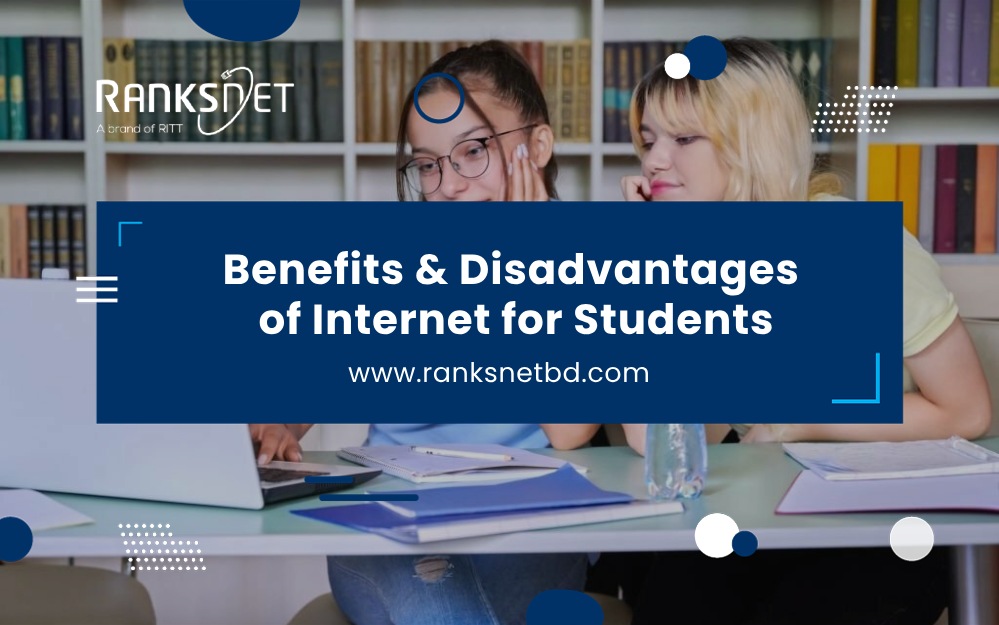Have you ever wondered how the internet affects students like you? Well, think of the internet as a tool with two sides, like a coin. On one side, there are some fantastic benefits. On the other, a few tricky disadvantages. Knowing both sides is important to make the internet work for you.
This blog will explore the benefits & disadvantages of the Internet for students. But we will also talk about the challenges it can bring.
The internet is like magic, and it is in your hands to use it wisely. Let’s start this journey and discover how it can improve your learning experience, sometimes a bit complicated.
5 Benefits of the Internet for Students?
The Internet has transformed the way students learn, connect, and explore. It has become an indispensable educational tool, offering students opportunities and benefits.
Let’s see how the Internet is making a positive impact on student’s life.
1. Access to a World of Information
The Internet is like a vast library where all the books are just a click away. Students can access various information, articles, research papers, and educational resources.
No more flipping through countless pages in the library or searching for that elusive book. The Internet puts knowledge at your fingertips.
2. Online Education Opportunities
One of the most remarkable benefits of the Internet is online education. The Internet offers countless courses and programs, whether you want to expand your knowledge in a specific subject or pursue a degree.
You can learn from top universities and institutions without leaving your home. It is a game-changer for students who may need access to traditional education.
3. Improved Communication
The Internet has revolutionized how students communicate. Teachers and students can connect more easily through email, video calls, and messaging apps.
This fosters better understanding and ensures students stay updated with assignments, course materials, and class announcements. It is a win-win for everyone.
4. Convenient Cloud Services
Remember the days of losing your assignments because your computer crashed? The Internet has solved that problem with cloud storage. Students can save their work in the cloud.
They can also ensure it is safe and accessible from any device with an internet connection. No more stressing about lost files right before a deadline.
5. Cost-Effective Learning
Education can be expensive, but the Internet is changing that. Many online resources and courses are free or at a fraction of the cost of traditional education. This makes learning more affordable and allows students to learn at their own pace. Making it more accessible for everyone.
Read our article to learn about-
Disadvantages of the Internet for Students?
The Internet is a powerful tool that students use for learning, entertainment, and connecting with others.
However, like most things, it has its drawbacks. In this section, we will explore the disadvantages of the Internet for students to help them make informed choices about their online activities.
-
Causes Distraction
The Internet offers countless distractions, from social media and online games to viral videos. Excessive internet use can lead to what is known as internet addiction, where students become so engrossed in online activities that they struggle to focus on their studies.
Research indicates that students are particularly vulnerable to the Internet. It can lead to difficulties like substance abuse, impulse control problems, anxiety, and mood disorders.
-
Kids Avoiding Outdoor Activities
Spending too much time online can have health consequences. Students skip outdoor activities and physical exercise. This lack of physical activity can contribute to various health issues, including eye strain and neck and shoulder problems.
Online gaming, which can be addictive, often encourages students to refrain from outdoor play, potentially affecting their social and physical development.
-
Losing the Ability to Communicate
While the Internet has improved communication in many ways, it has also led to an interesting dilemma. Students are becoming more adept at communicating online but may need help with face-to-face interactions.
Spending excessive time communicating through screens can lead to a disconnect with in-person communication skills, which are essential in the real world.
-
Spending More Time Online
The allure of movies, social media, and online chatting can tempt students to spend excessive time online. It is leading to neglect of academic responsibilities. Balancing entertainment with academic duties can be challenging. Students may need help prioritizing their studies when the Internet distracts them.
-
Health Concerns
Using the Internet typically involves staring at screens, whether on computers or smartphones. This extended screen time can result in various health issues, such as neck and back pain and eye strain.
The blue light emitted by screens has also been linked to eye problems, including difficulties focusing and visual impairment.
-
Privacy Issues
Internet use can put students’ privacy at risk. Hackers may target students, accessing personal information on their computers and mobile phones.
Online blackmail is a serious concern, and students have seen their private content spread on the Internet. In some tragic cases, this has led to students taking their lives.
-
Student’s Cyberbullying
Cyberbullying is a prevalent negative consequence of the Internet. Many students use the Internet to bully their peers, leading to emotional distress and sometimes more severe consequences. Cyberbullying and online crime are on the rise, and students are often the victims.
-
Causing Anonymity
The Internet allows individuals to remain anonymous when accessing various websites, forums, and chat rooms. While this anonymity can have legitimate uses, it also enables malicious individuals to exploit innocent people.
Fraud and scams are common, and individuals can use deceptive tactics to exploit unsuspecting victims.
-
Vulgarity
The Internet exposes students to various forms of inappropriate content, including violence and pornography. In comparison, many websites attempt to restrict access to mature content.
There are no foolproof age verification systems. This means that underage children can easily access material intended for adults, which can have negative effects on their mental well-being.
Remember, the internet should be a useful and enjoyable part of your life. It is important to strike a balance and prioritize your well-being and education.
Final words
Students enjoy immense benefits from the internet but must also contend with potential drawbacks. It is about striking a balance. Students must harness the internet’s benefits while safeguarding against its pitfalls.
The internet is an integral part of a student’s journey. Your ability to make it a positive force lies in your hands. Responsible use lets you turn the internet into a powerful learning and personal growth tool. Stay curious, learn wisely, and keep the digital world on your side.
FAQ
What are the key benefits of the Internet for students?
The Internet offers students access to information, online education opportunities, seamless communication with teachers and peers, convenient cloud storage, and cost-effective learning options.
What are some common disadvantages of the Internet for students?
Common disadvantages include the potential for distraction and internet addiction, reduced physical activity and health concerns, challenges with face-to-face communication, etc.
How can students strike a balance between the internet’s benefits and disadvantages?
Students can find a balance by managing their time wisely, protecting their online privacy, and being cautious about their internet activities.



